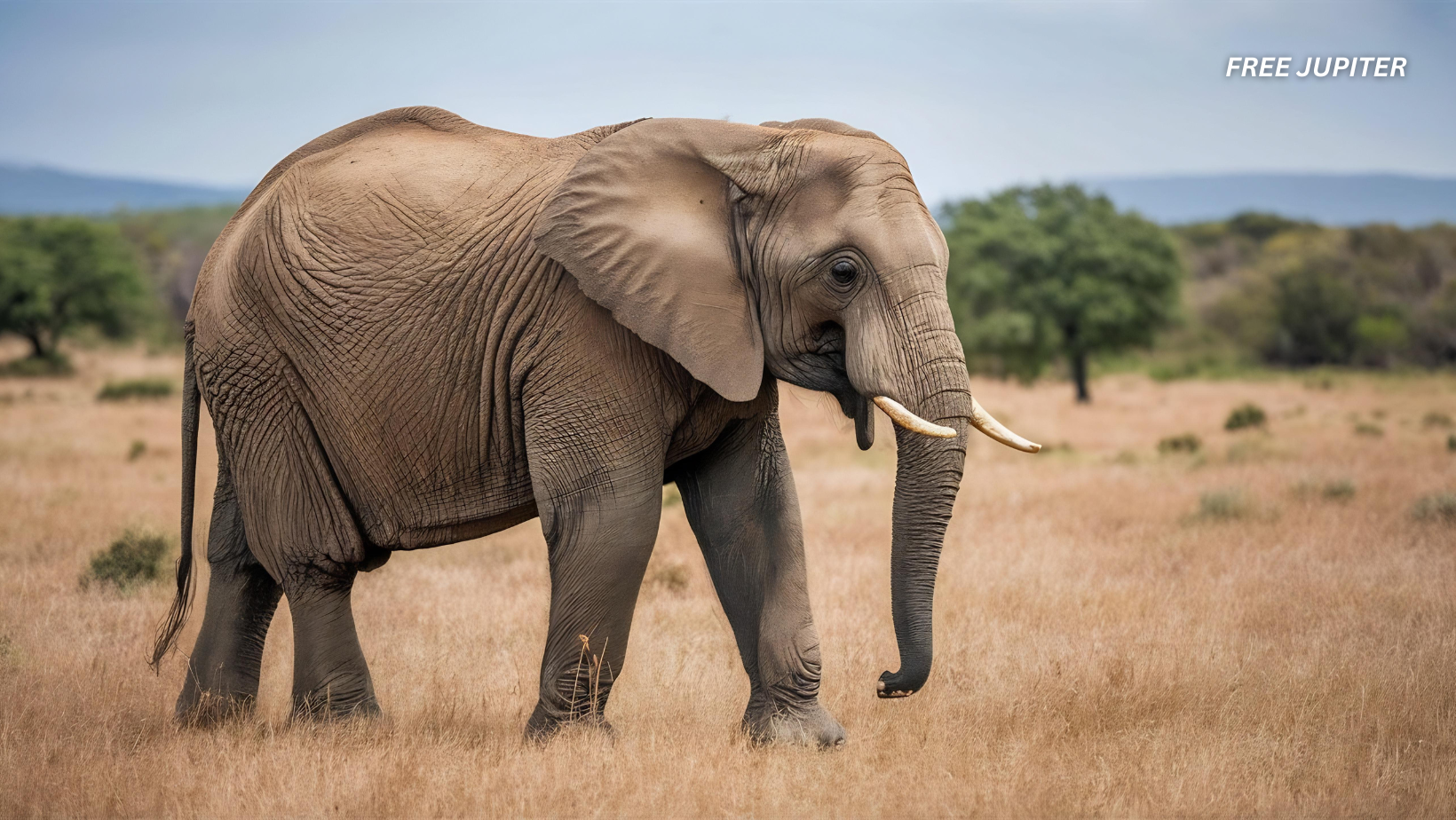If you ever find yourself lost in the African savanna, parched and desperate for water, there’s one unlikely guide who could save your life: an elephant. These massive, wrinkled giants are not just strong and social—they also happen to be some of the best sniffers on Earth.
Scientists have long known that elephants use their trunks to explore, communicate, and even spray mud like an oversized water gun. But new research reveals that elephants can literally smell water—and not just the liquid itself, but the difference between natural water and distilled, purified water. It’s like giving them a blindfold test and watching them ace it every single time.
The Nose Knows: A Study in Elephant Superpowers
A team of researchers decided to put elephants’ noses to the test. They worked with semi-tame African elephants, giving them a choice between buckets of different water types: natural, artificially treated, and distilled. The results? The elephants consistently went for the natural and artificial water while ignoring the distilled option.
Why? Distilled water is pure, stripped of all the little “extras” we rarely notice. But to an elephant, those extras—tiny natural chemicals that give water its earthy smell—make all the difference. Without them, water seems suspicious, maybe even useless.
Here’s where things get fascinating: elephants could detect certain volatile organic compounds (or VOCs, for short). Scientists thought these compounds—like geosmin (the same chemical that makes soil smell wonderful after rain), 2-methylisoborneol, and dimethyl sulphide—might be the secret signals. Strangely enough, none of those compounds were present in the actual water samples used. That means elephants are probably tuned into other, subtler chemical cues we don’t yet understand.
In simpler words: elephants have a built-in water detector that works on smells we humans can’t even identify.
Curious Fact About Animals – Elephants Can Smell Water from Miles Away
Read more: New Study Shows Elephants Have Been Attempting to Communicate With Us For Years
Why Smelling Water Matters in the Wild
At first glance, this ability sounds like a fun party trick. But for elephants, it’s a survival tool. Imagine living in regions where dry seasons last for months and water sources shrink to a few hidden spots. Being able to sniff out a drink—even when it’s underground or far off—can make the difference between life and death.
This skill likely developed as an evolutionary advantage. Elephants live in some of the harshest environments on Earth, from scorching savannas to dusty deserts. A nose that can tell real water from a false lead helps them travel wisely, avoid wasted effort, and guide their herd to survival.
And it’s not just about drinking. Elephants use water to cool off, play, and even form social bonds. A muddy bath isn’t only refreshing—it protects their sensitive skin and creates the perfect excuse for herd-wide splashing sessions. Without reliable access to water, many aspects of elephant life fall apart.
Conservation Twist: How Humans Fit Into the Story
Here’s where humans come in. Elephants often compete with people for water, especially in drought-prone areas. Villagers dig wells, farmers set up irrigation systems, and elephants—following their noses—sometimes raid these human-made supplies. Naturally, that leads to conflict.
If conservationists understand exactly how elephants detect water, they might find new ways to reduce clashes. For example, knowing which scents attract elephants could help design water points that keep herds away from farmland. Or, in times of crisis, wildlife managers might use olfactory cues to guide elephants toward safer, sustainable water sources.
It also gives us a glimpse into just how extraordinary their senses are. While we fuss over bottled water brands and filter systems, elephants can simply inhale and tell which water is worth their time.
Not the Only Super-Sniffers
Elephants aren’t alone in their olfactory talents. The animal kingdom is filled with remarkable sniffers:
- Dogs can detect some cancers, find explosives, and track lost hikers for miles. Their noses are so sensitive they can pick up on a single molecule in a sea of billions.
- Sharks can smell a drop of blood in a pool of water as large as an Olympic-sized swimming pool.
- Moles and rodents rely on smell to navigate underground tunnels where sight is useless.
Yet elephants still hold one of the top spots. Their trunks contain about 2,000 olfactory receptor genes—far more than dogs or humans. It’s no wonder they can out-sniff us so thoroughly.
Read more: Grandma Elephant Pauses to Thank Drivers for Letting Herd Cross The Road Safely
Related Curiosity: Do Elephants Smell Rain?
There’s another intriguing question scientists are still exploring: can elephants smell rainstorms from far away? Many African communities have long believed elephants sense approaching rain and travel toward it. Some studies suggest they may detect distant thunderstorms not just by smell but also by low-frequency sounds or vibrations carried through the ground.
If true, it would mean elephants are like living weather stations—sniffing and listening their way to the promise of water. It’s another reminder that while humans rely on forecasts and radar apps, animals often depend on instincts honed over millions of years.
The Mystery of Long-Distance Detection
The study we mentioned earlier shows elephants can distinguish water types at short range. But here’s the lingering mystery: can they smell water from miles away?
There are plenty of anecdotes from field researchers and local communities suggesting they can. Stories tell of elephants heading straight toward waterholes from unseen distances, even across dry, barren land. But proving this scientifically is tricky. Smells don’t travel consistently—wind, terrain, and weather can all interfere.
Future studies might use GPS tracking and controlled experiments to find out just how far an elephant’s nose can carry. If they can indeed smell water several miles away, it cements their reputation as survival masters of the animal world.
Lessons for Humans: Our Weak Noses
Compared to elephants, our noses are laughably underwhelming. Humans have only about 400 olfactory receptor genes, a tiny fraction of what elephants carry. While we can appreciate the scent of fresh rain or a cup of coffee, we’re blind to the countless subtle cues animals detect all the time.
In fact, some researchers think elephants could one day help humans in practical ways, similar to how dogs are trained to detect bombs or medical conditions. Imagine using elephants to locate underground water in drought-stricken areas. It sounds far-fetched, but stranger things have happened in conservation science.
Why This Story Matters
At the heart of this quirky discovery is a bigger message: animals often know far more about their environment than we do. While humans build machines and rely on technology to detect water, elephants carry the equipment right on their faces.
Understanding these natural abilities not only helps protect elephants but also reminds us of the delicate balance we share with them. In a world where water scarcity is becoming a global issue, the fact that elephants have already mastered the art of water detection is both humbling and inspiring.
Read more: Conservation Efforts Revive the Spix’s Macaw From The Brink Of Extinction!
Final Sip of Wisdom
So the next time you see an elephant at the zoo, gently swinging its trunk, remember: you’re looking at one of nature’s greatest survival tools. That long, flexible nose is more than a straw or a showerhead—it’s a living compass, pointing toward the most essential resource on Earth.
And while we may never match an elephant’s super-sniffing skills, we can at least learn to appreciate how deeply connected they are to the natural world—and how much we still have to discover about it.
Featured image: Freepik.
Friendly Note: FreeJupiter.com shares general information for curious minds. Please fact-check all claims and double-check health info with a qualified professional. 🌱










